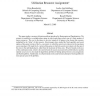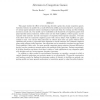110
Voted
DSS
2000
15 years 29 days ago
2000
This paper studies the quality of service (QoS) provision problem in noncooperative networks where applications or users are sel
sh and routers implement generalized processor sha...
117
Voted
CORR
2004
Springer
15 years 1 months ago
2004
Springer
A growing body of literature in networked systems research relies on game theory and mechanism design to model and address the potential lack of cooperation between self-intereste...
111
Voted
TCS
2008
15 years 1 months ago
2008
We investigate the complexity of finding Nash equilibria in which the strategy of each player is uniform on its support set. We show that, even for a restricted class of win-lose ...
99
Voted
JDA
2006
15 years 1 months ago
2006
This paper studies a resource allocation problem introduced by Koutsoupias and Papadimitriou. The scenario is modelled as a multiple-player game in which each player selects one o...
127
Voted
JSAC
2008
15 years 1 months ago
2008
In this paper, we investigate the coverage problem in wireless sensor networks using a game theory method. We assume that nodes are randomly scattered in a sensor field and the goa...
110
Voted
CSJM
2006
15 years 1 months ago
2006
The Nash equilibria set (NES) is described as an intersection of graphs of best response mappings. The problem of NES computing for multi-matrix extended games is considered. A me...
107
Voted
CORR
2008
Springer
15 years 1 months ago
2008
Springer
Abstract. We introduce two min-max problems: the first problem is to minimize the supremum of finitely many rational functions over a compact basic semi-algebraic set whereas the s...
112
Voted
CORR
2008
Springer
15 years 1 months ago
2008
Springer
This paper studies the effects of introducing altruistic agents into atomic congestion games. Altruistic behavior is modeled by a trade-off between selfish and social objectives. ...
125
click to vote
CORR
2008
Springer
15 years 1 months ago
2008
Springer
Many models from a variety of areas involve the computation of an equilibrium or fixed point of some kind. Examples include Nash equilibria in games; market equilibria; computing o...
122
Voted
CORR
2008
Springer
15 years 1 months ago
2008
Springer
Abstract. We consider the problem of computing Nash Equilibria of action-graph games (AGGs). AGGs, introduced by Bhat and Leyton-Brown, is a succinct representation of games that e...


